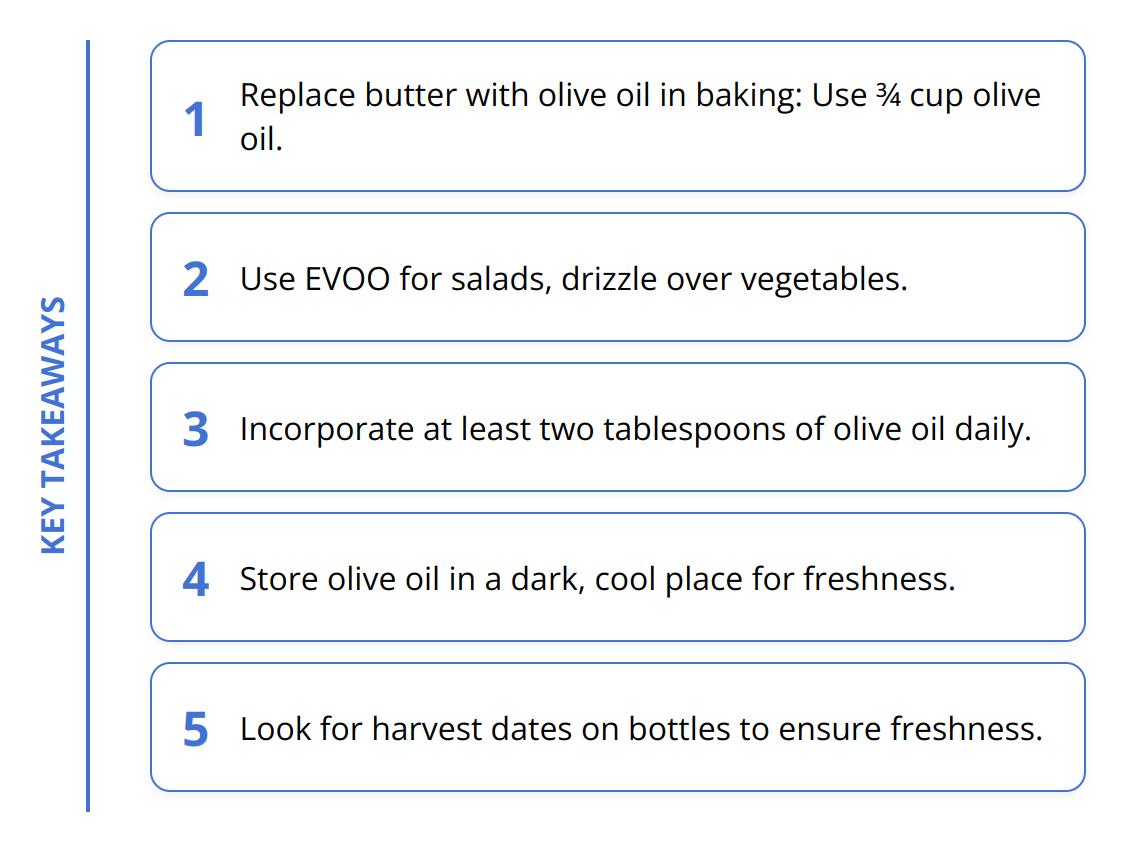Olive Oil Benefits: All You Need to Know

Olive oil is celebrated for its versatility in the kitchen and its myriad health benefits. We at Healthy Tips You Blog believe understanding its nutritional profile and the best ways to incorporate it into your diet can significantly enhance your health and well-being.
This post aims to unfold the remarkable advantages of olive oil, from its heart-healthy fats to its high antioxidant content. Let’s explore how to make the most of this golden elixir in daily meals and beyond.
Olive Oil for Improved Health
Olive oil, a cornerstone of the Mediterranean diet, stands out not just for its culinary utility but for its impressive array of health benefits. It’s particularly noted for being rich in monounsaturated fats and antioxidants, contributing to its heart-healthy reputation.
Monounsaturated fats, predominantly found in olive oil, are vital for heart health. These fats support healthy cholesterol levels by lowering harmful LDL cholesterol and elevating beneficial HDL cholesterol. Integrating olive oil into your diet is a straightforward approach to reaping these benefits. Opt for olive oil in dressings or for light sautéing rather than using jars of butter or other saturated fats.

Antioxidants in olive oil, such as polyphenols, play a critical role in preventing cell damage by combatting oxidative stress. This not only contributes to heart health but also offers protection against a range of diseases, including potentially lowering cancer risk. To maximize your intake of these antioxidants, choose extra-virgin olive oil (EVOO), which is less processed and retains more of these beneficial compounds.

Heart health benefits are amongst the most compelling reasons to include olive oil in your diet. Studies have shown that people consuming olive oil regularly have lower rates of heart disease. It’s not just about adding olive oil to your diet but also replacing unhealthy fats with it. Changing from using butter to olive oil in your cooking can significantly impact your overall health.
For actionable tips and deeper insights into specific health benefits, reading more on topics such as Mediterranean diet benefits can provide valuable guidance. Incorporating olive oil isn’t just about adding a new ingredient to your meals; it’s about making a holistic shift toward a healthier lifestyle.
- Practical Tips:
- Use EVOO in salads or drizzle overcooked vegetables.
- Replace butter with olive oil in baking recipes.
- Incorporate at least two tablespoons of olive oil daily for heart health.
Understanding the types of olive oil and their best uses can further enhance your diet. Extra virgin olive oil, known for its robust flavor and health properties, is ideal for dressings and low-heat cooking. Refined olive oils may be more suitable for high-heat cooking due to their higher smoke points.
In conclusion, olive oil offers a delicious and simple way to boost your overall health, particularly heart health, through its rich content of monounsaturated fats and antioxidants. Integrating olive oil into your daily diet, whether through cooking, as a salad dressing, or even in baking, can contribute to a healthier heart and a reduced risk of chronic diseases.
Nutritional Benefits and Types
Olive oil is a nutrient powerhouse, offering a beneficial blend of fat, vitamins, and antioxidants that have made it a staple in health-conscious diets. Knowing olive oil’s nutritional content and the difference between its varieties can significantly impact how effectively you integrate this oil into your diet for optimal health benefits.
Nutritional Content Overview
Each tablespoon of olive oil contains approximately 120 calories, predominantly from fats. However, these are primarily monounsaturated fats (MUFAs), known for their health benefits, particularly for heart health. Olive oil is also a valuable source of vitamin E, an antioxidant that supports skin health and immunity. Additionally, olive oil boasts polyphenols, compounds that have been shown to reduce inflammation and may protect against certain chronic diseases.
Understanding Olive Oil Varieties
Not all olive oil types are created equal. The variety you choose should depend on how you plan to use it and the health benefits you’re aiming to achieve.
- Extra Virgin Olive Oil (EVOO) is the highest-quality olive oil. Due to minimal processing, it retains most of the natural flavors, vitamins, and minerals. It’s ideal for salads, dipping, and low-heat cooking.
- Virgin Olive Oil is slightly less intense than EVOO but still offers many health benefits and is suitable for similar uses.
- Refined Olive Oils, including Light and Pure Olive Oil, are processed to neutralize flavors and have a higher smoke point. This makes them better for frying or high-heat cooking but with fewer health properties.
Quality and Nutrient Content
Olive oil’s quality can significantly influence its nutrient content and health benefits. EVOO, the least processed form, contains the highest levels of antioxidants and polyphenols. Its production does not involve heat or chemicals, preserving the integrity of its nutrients. Consequently, choosing EVOO for its health benefits is a wise decision, but it’s crucial to ensure authenticity since the market has instances of mislabeled products.

Practical Tips
- Opt for EVOO for raw applications or low-heat cooking to maximize your intake of beneficial antioxidants.
- Use refined olive oils for high-heat cooking to avoid damaging the delicate polyphenols in EVOO.
- Store olive oil in a dark, cool place to preserve its nutritional quality.
- Look for harvest dates on bottles to ensure freshness, as olive oil can degrade over time.
Incorporating olive oil into your diet is more than a culinary choice; it’s a health decision. Making educated selections about the types of olive oil you consume can amplify the cardiovascular, anti-inflammatory, and antioxidant benefits you receive. Explore more on integrating heart-healthy fats into your diet with our guide on developing healthy eating habits.
Selecting high-quality olive oil and understanding the best uses for different types ensures you receive the maximum health benefits from this versatile, nutrient-rich oil. Whether dressing a salad with EVOO or cooking at high temperatures with refined olive oil, your body will thank you for including this healthy fat in your meals.
How to Use Olive Oil
Discovering olive oil’s versatility can transform your diet and open up a myriad of health benefits. Beyond its well-documented role in heart health, olive oil brings flavor and nutritional value to every dish it graces. Let’s explore some specific, actionable ways to integrate olive oil into your daily routine, beyond the usual drizzle on a salad.
Cooking and Baking with Olive Oil
Olive oil is not only for savory dishes; it can be a game-changer in baking too. Replacing butter with olive oil in recipes can decrease the saturated fat content and add a subtle, pleasing flavor. It’s perfect for making moist cakes, bread, and even cookies. Here’s how to make the swap successfully:
- If a recipe calls for 1 cup of butter, use ¾ cup of olive oil as a substitute.
- Olive oil is ideal for roasting and sautéing. Its high smoke point (especially the refined variety) also makes it suitable for frying.
- Olive oil can be used in marinades to tenderize and add flavor to meat and vegetables.
Olive Oil as a Salad Dressing
Salads and olive oil go hand in hand. Creating a homemade dressing with extra virgin olive oil tastes better than store-bought versions and boosts your intake of healthy fats and antioxidants. Mix EVOO with vinegar, mustard, and herbs for a simple yet delicious dressing. Here’s a quick recipe to start:
- Whisk together 3 parts olive oil and 1 part vinegar (balsamic or apple cider works well).
- Add a teaspoon of Dijon mustard and a pinch of salt and pepper.
- Customize it by adding minced garlic, lemon juice, or honey according to your taste.
Creative Uses Beyond the Kitchen
Olive oil’s benefits extend beyond dietary uses. Its rich composition makes it great for skin and hair care:
- Moisturizer and Exfoliant: Mix olive oil with sea salt to create a natural, nourishing body scrub.
- Hair Treatment: Warm olive oil can be applied to the ends of the hair to help control frizz and add shine.
- Makeup Remover: A few drops of olive oil on a cotton pad gently remove eye makeup while nourishing the delicate skin.
Incorporating olive oil into your life is more than just a dietary choice; it’s a holistic approach to wellness. The possibilities are endless, from swapping out saturated fats in baking to using it as a natural beauty remedy. Embracing olive oil in daily routines can pave the way to a healthier, inside and out lifestyle. For more ideas and recipes, explore our guide on Mediterranean diet benefits, highlighting how olive oil plays a central role in one of the world’s healthiest diets.
Final Thoughts
Olive oil, a key component of the Mediterranean diet, is more than just a kitchen staple. Its health benefits range from heart health enhancements to antioxidant riches that combat disease and inflammation. We’ve explored how incorporating this golden elixir into your daily diet can substantially improve your health, from lowering the risk of chronic diseases to providing essential nutrients that support overall well-being.

Exploring different varieties of olive oil can also enrich your culinary experience and maximize health benefits. Whether you choose Extra Virgin Olive Oil for its pure flavor and nutrient content or refined varieties for high-heat cooking, each type serves a purpose in both your kitchen and your health regimen.
Here are some tips for integrating olive oil into your meals:
- Make olive oil your primary cooking fat.
- Experiment with olive oil in baking.
- Craft your own salad dressings with a base of EVOO.
- Incorporate olive oil into marinades to enhance flavor and nutrition.
We encourage you to continue exploring olive oil’s diverse uses and benefits. Start experimenting with different types to find what works best for your diet and lifestyle. Remember, making small changes, like substituting olive oil for less healthy fats, can significantly impact your health over time.
For more insights into adopting a heart-healthy and nutritious diet centered around olive oil and other wholesome ingredients, visit us at Healthy Tips You Blog. Dive into our comprehensive guides and recipes to fully embrace the Mediterranean way of eating for a vibrant, healthier future.







7 Comments